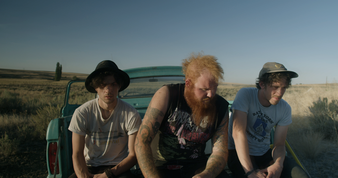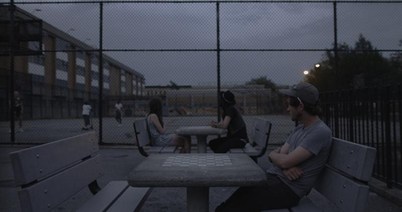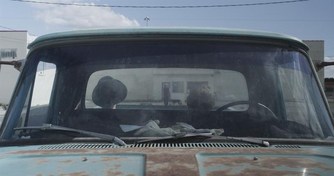
To live a life devoted to all that is beautiful and right... to pursue an existence of virtue and grace... to attain a state of Good. And not just any good, but the highest good. This is what "summum bonam" means, a Latin expression that means "the highest good". First introduced into the philosophical lexicon by Cicero as an idea of something all humans should strive to achieve, it's a phrase that has come to have its limits questioned over the years. After all, different people will have different ideas as to what "good" means, be it a more profound connection to God, Nature or one another. Summum Bonam is also the title (and apparently the primary thematic drive) for the new film from relative newcomer Matias Penachino.

Both Jude and Gore are, in their own ways, deeply unwell. Gore's personal relationships with his girlfriend and friends have deteriorated to the point where he is unable to even talk to them, and Jude can barely bring himself to do anything other than lie in bed and smoke. To some degree, this has yielded a very physical toll on the two of them. Gore seems to suffer from both tonitis and bleeding in his ears, whilst Jude has the far more serious complication of a failing heart. These issues (indicative of something both literally and metaphorically wrong with them) present both young men just enough spark to return to their home, to find themselves once again before the are consumed completely.
The road trip the pair undertake is relatively uneventful, but very sobering. Along the way, they meet up with an old friend, a former soldier now in a part time rock band. This friend is himself troubled by his past and what he has seen, and so would seem to be struggling with a different kind of existential slump as the brothers. It is in their brief time with him that they get their first real shock of life and death, something that both validates the necessity for their journey and that, for now, it appears to be working.

Penachino presents his story in a very distinct visual style, in that each shot is a very composed and actually very beautiful image, presented in almost every instance without a bit of movement. There is perhaps only a single pan, very rarely any moving in or even cutting to a different angle. It's a stylistic choice that perhaps consciously tries to evoke the memory of Ozu, attempting to tap into a kindred spirit that espouses the need for human connection and interaction. The colour palette of the film also makes a gradual transition as the brothers make their way homeward, shifting from the gloomy blues and blacks to the bright yellows and vibrant blues, the grim dark to the shining sun.
There will be some who find the seemingly endless takes of very little grating, even monotonous, although this will probably be more a case of personal preference that dictates tolerance for such scenes. However, a far greater contention with Summum Bonam is that a cow is killed onscreen. Now, the purpose for it within the story may have skipped by, though the thematic purpose within the film is clear as it relates to the two brothers. All this being said, does this excuse such a scene? Is the death of a living creature for the purposes of film ever justified, particularly when the film is attempting to make a point about goodness and generosity? I would argue that it is not. (I should note that I did try to find out whether or not the killing of this cow was real or not, but was unable to find an answer... though it looked pretty damn real to me).
Summum Bonam is not an easy watch by some standards, but it is sincere in its assertions of how one can live a better, more fulfilling life. It also manages to avoid being overly didactic, which is a great achievement on its own. It is rather a shame that such a beautifully shot and well-intentioned film be sullied by the harming of an animal, regardless of intent.
Summum Bonam is screening on the 20th of June at Rich Mix. It will be part of the East End Film Festival. Buy tickets here!

 RSS Feed
RSS Feed
